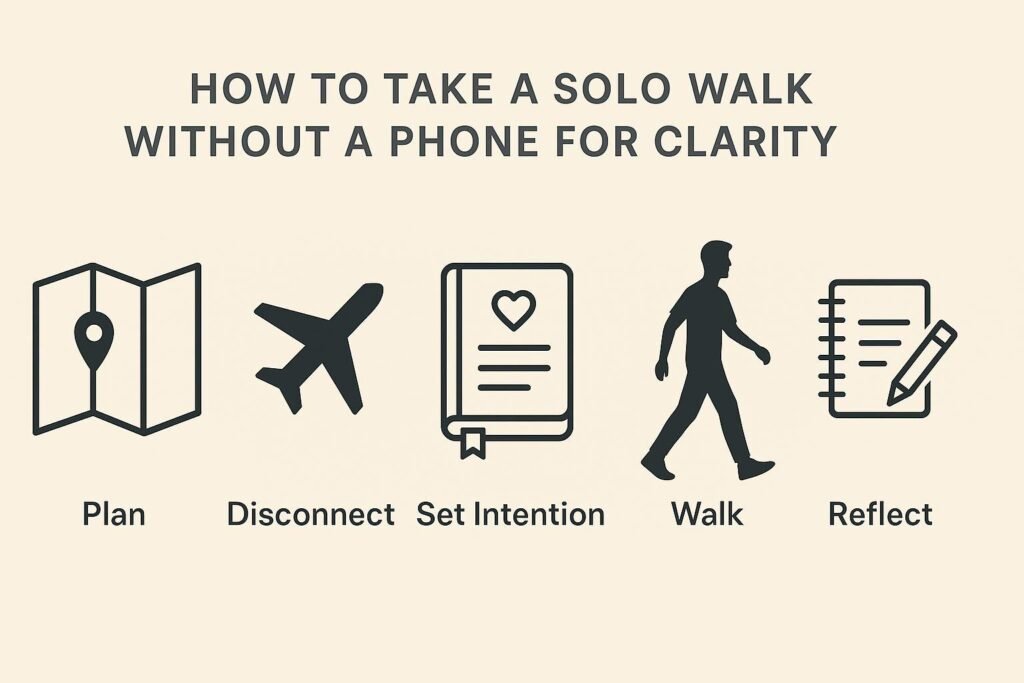Introduction: The Art of Being Alone (Without Feeling Lonely)
Solo Walk Without a Phone This Weekend. Let’s start with a bold challenge, and a quiet rebellion: Can you go for a full hour without your phone? No music. No podcasts. No texts. Just your thoughts… and your feet.
Sounds simple. But in a world where being unreachable for five minutes feels like committing social suicide, this challenge might feel more radical than shaving your head and moving to the mountains.
Before you roll your eyes and mutter something about “being too busy,” hear me out. This isn’t about punishing yourself or becoming a monk overnight. This is about reclaiming solitude as a masculine edge. It’s about testing the silence and seeing what comes up.
Because if you’re like most modern men, your brain is a browser with 47 open tabs, and none of them are loading. Silence feels foreign. Being alone without a device? Practically prehistoric. And yet, that’s precisely why it’s powerful.
And here’s the kicker: this isn’t some fluffy mindfulness retreat repackaged as advice. This is real, raw masculine practice. It’s leadership over your own attention. It’s self-mastery in a world built to distract. It’s a direct response to the focus keyword that’s been quietly begging to be embodied: a solo walk without a phone.
Because the man who can be alone, with himself, and not reach for a dopamine hit? That’s a dangerous man, in the best possible way.
This 1-hour solo walk isn’t about steps or fitness. It’s about presence. It’s about reclaiming your edge. And yes, it will feel weird at first. That’s the point.
Let’s walk through it, together, ironically, in silence.
Let’s start with a bold challenge, and a quiet rebellion: Can you go for a full hour without your phone? No music. No podcasts. No texts. Just your thoughts… and your feet.
Before you roll your eyes and mutter something about “being too busy,” hear me out. This isn’t about punishing yourself or becoming a monk overnight. This is about reclaiming solitude as a masculine edge. It’s about testing the silence and seeing what comes up.
Table of Contents
Why This Walk Matters (More Than You Think)

Let’s be honest: the phrase ‘solo walk without a phone’ sounds like something your grandfather might’ve done in 1953 after dinner, not something a modern man, juggling work, dopamine hits, and a mountain of notifications, would voluntarily sign up for. And yet… that’s exactly what makes it revolutionary.
In today’s world, solitude isn’t just rare, it’s borderline rebellious. Choosing to be unavailable, even for an hour, feels like social disobedience. And ironically, that’s where the real power lies.
Solitude, when chosen with intention, isn’t weakness; it’s a masculine reset button. It’s the pause between punches. The silence before the storm. In a culture that rewards constant output, choosing inner stillness is a radical act of leadership. Not the loud kind that posts quotes on Instagram, but the quiet kind that builds unshakable clarity.
According to a 2017 study by the University of Buffalo, intentional solitude is linked to stronger emotional regulation, creative thinking, and psychological resilience. No, not scrolling alone on the toilet, real solitude. Walking. Thinking. Noticing.
“2017 study by the University of Buffalo”
When you take that solo walk without a phone, you’re not escaping. You’re not being weird. You’re recalibrating. You’re unplugging from the noise and tuning back into something ancient. Something primal. You.
This isn’t a hack. It’s not “biohacking your cortisol” or whatever the next $100 course will promise you. It’s just one man, one walk, and the quiet between your own thoughts.
And if that makes you uncomfortable, good. That’s where the work begins.
Solitude isn’t weakness. It’s a masculine reset button. And in a world that constantly screams for your attention, choosing stillness is an act of strength.
Studies show that spending time alone without distractions helps improve memory, mood regulation, and even creative problem-solving. According to a 2017 study from the University of Buffalo, intentional solitude is linked with greater psychological resilience and personal growth.
When you take that walk without your phone, you’re not escaping, you’re recalibrating.
You’re letting your nervous system breathe. You’re letting your thoughts catch up. You’re choosing depth in a world addicted to dopamine.
Step-by-Step: How to Take This Walk Like a Man With a Mission

Step 1: Choose Your Terrain
Pick a route that feels safe, simple, and ideally quiet. It could be a local park. It could be a suburban loop. It could be the beach. Doesn’t have to be scenic, just walkable.
Step 2: Leave the Phone Behind
This is the non-negotiable part. Turn it off. Put it in a drawer. Or if you must bring it for safety, aeroplane mode is your best friend. No exceptions.
Step 3: Set an Intention
Before stepping out, ask yourself:
- What do I want to hear in the silence?
- What am I avoiding?
- What do I need to confront, accept, or imagine?
It doesn’t need to be deep. Just deliberate.
Step 4: Let It Get Uncomfortable
Within 10 minutes, your brain will try to entertain you. Resist. Boredom is the gateway to insight. Feel the discomfort. Walk through it.
Step 5: Observe Without Judgment
Look around. Smell the air. Hear your footsteps. Notice your thoughts like clouds, don’t chase them. Just notice.
Tools or Resources That Help
- Minimalist Watches: Track time without triggering phone-checking.
- Field Notes Journal: Write post-walk reflections.
- “Digital Minimalism” by Cal Newport: Deep dive into intentional tech use.
- “Digital Minimalism by Cal Newport”
- Noise-cancelling earplugs (if you’re walking in the city).
Common Mistakes Men Make
- Using the walk to plan content, this isn’t a productivity hack. Its presence.
- Checking the time every 5 minutes, trust your body. 60 minutes will pass.
- Quitting halfway through, Discomfort is the test. The second half is the reward.
“constant output and multitasking”
Bonus Insight: What You Learn in the Silence
Here’s the thing: silence reveals. It peels back the noise and leaves you face-to-face with who you really are, no distractions, no filters, no curated content.
Many men are terrified of that mirror. But the truth is, the man who can walk with his own thoughts… walks with powner.
This walk is a ritual. A reclamation. A return to self.

FAQ
Q: Can I listen to music or a podcast during the walk?
A: Not this time. That’s the whole point. This is about being with your own mind.
Q: What if I get bored or anxious?
A: You probably will, and that’s good. That’s where the real work begins.
Q: Is it okay to walk in the city or somewhere busy?
A: Yes, as long as you stay present. Ideally, aim for somewhere you can think clearly.
Q: What if I forget something important during the walk?
A: Carry a small notepad or use a pen to mark your hand. Just don’t break the silence with a screen.
Conclusion
You don’t need another podcast, another app, or another hack. You need space. And silence. And stillness.
So this weekend, challenge yourself. One hour. No phone. Just you, your breath, and the path.
You might just meet the man you’ve been trying to become.
Suggested Articles
1. The Weekend Solo Ritual That Reconnects Me With Purpose
Uncover the deeper value of solitude as a tool for masculine clarity.
2. How Masculine Men Communicate Without Needing to Explain Themselves
Explore the subtle power of presence and non-verbal leadership.
3. Brotherhood & Solitude: The Masculine Polarity That Builds Leaders
Understand how solitude and connection shape powerful masculine identity.
4. Why Most Men Feel Isolated, and What to Do About It
Tackle the root of masculine loneliness and discover real solutions.
5. Reclaiming Brotherhood in a Lonely World: Where to Start
Start building intentional male friendships from the ground up.


